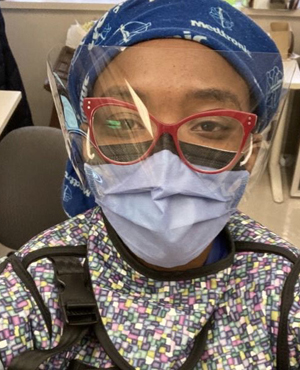Feature: Hope and purpose propel clinical fellow’s international journey
 By Emily Leighton, MA'13
By Emily Leighton, MA'13
The call from South Africa’s military came as a complete surprise.
Dr. Viwe Mtwesi – at the time, a junior doctor in the midst of her speciality training in internal medicine – was being recruited to join Nelson Mandela’s health care team.
“I thought it was a prank at first,” she said. “I kept thinking, ‘why me?’ There are more qualified people.”
But it was no prank. Mtwesi cared for Mandela for several months. For her service, she was awarded the Mandela Medallion Gold Medal.
She says spending time with the global icon and activist instilled in her a sense of hope and purpose.
“I realized nothing is out of reach for me,” she said. “My dreams are valid, and I want to continue his powerful legacy of helping others.”
Mtwesi is currently pursuing an electrophysiology fellowship at Schulich Medicine & Dentistry, focusing on diagnostic and therapeutic techniques for heart rhythm conditions.
“There is great need for this training and expertise in South Africa,” she explained. “Electrophysiology is mainly offered in the private sector and only 16 per cent of the population can afford private care. We also don’t have many qualified physicians in this area.”
Born in a small rural village in South Africa, Mtwesi says she comes from a strong family environment. As a child, she lived with extended family members, who supported her throughout her education.
Medicine wasn’t the career path she envisioned, initially hoping to pursue engineering or business. She also worked for a time as a professional Latin American dancer and was hesitant to give up her dancing career for higher education.
“Medicine seemed to be taking so much from me,” she said. “But coming from an academic home, I felt it was the best path forward.”
After completing her undergraduate medical studies at Walter Sisulu University, Mtwesi went on to pursue four years of specialized training in general internal medicine, as well as three years in cardiology at Wits University.
It was during her internship following medical school that a love and appreciation for medicine took hold. “Working with patients, I realized the impact I was having, even as an intern,” she said. “People would be so grateful to see me because they had nowhere else to turn.”
At 32, Mtwesi became the youngest cardiologist in South Africa, an achievement widely celebrated in the country’s media.
The attention still doesn’t sit well with her, even years later.
“Every media encounter emphasized my Blackness,” she said. “I’m supposed to be proud of being young, female and Black, but it’s not my entire story.”
 With the urgent need for electrophysiologists, Mtwesi set her sights abroad, landing first at McMaster University and transferring to Schulich Medicine & Dentistry’s program in 2021.
With the urgent need for electrophysiologists, Mtwesi set her sights abroad, landing first at McMaster University and transferring to Schulich Medicine & Dentistry’s program in 2021.
Calling the program the best in Canada for electrophysiology training, she is grateful for the teachers and mentors who have guided her development.
“It’s hard to find great clinician teachers, that combination is very rare,” she said. “Certificates don’t make someone a good doctor, and the faculty have helped me understand that. They have taught me to know my strengths, but also to know my limits.”
“I count myself among the luckiest to be training at Western, it has been the greatest gift,” she added.
With only a few months remaining in the fellowship program, Mtwesi is thinking about the future.
She is committed to improving access to care in South Africa, with goals to establish an electrophysiology centre for patients who cannot afford private care options. She would also like to form a collaboration between Western and the University of Witwatersand in Johannesburg focused on research and academic mentorship.
“I can be the bridge between the two institutions,” she said. “We’re hoping to start with cardiology and expand to more departments.”
Returning to her home country will be bittersweet, says Mtwesi. In many ways, South Africa is still struggling to fulfill Mandela’s hopes for the nation. Racial and economic inequalities persist, and the country is trying to address major issues, such as political corruption, crime, poverty and access to health and education.
“South Africa is a beautiful country with beautiful people, but it has many challenges,” she said.
In 2016, Mtwesi launched a non-profit medical tourism company, Reeega Medical Tourism, to help people find quality medical care in the country and beyond its borders. “It’s a difficult system for people to navigate, to find reputable doctors and services” she explained.
She plans to revive the company once she completes her fellowship.
In addition to entrepreneurial pursuits, Mtwesi also sees herself as an advocate for women and children. “I would love to work with the United Nations, to fight for African women especially,” she said. “There’s a greater cause for each and every one of us, above what our social standing or job define us to be.”









